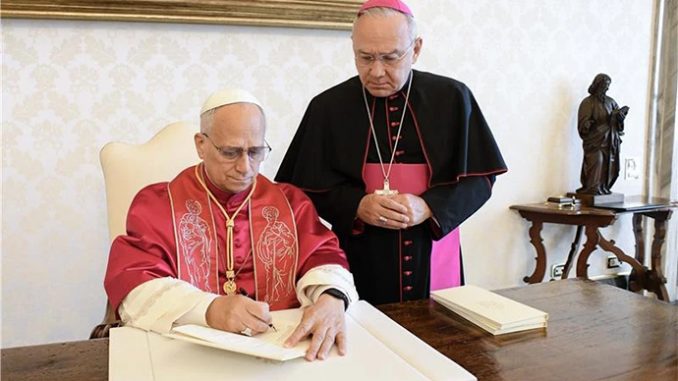
CNA Staff, Oct 4, 2025 / 14:39 pm (CNA).
Pope Leo XIV on Oct. 4 signed the first apostolic exhortation of his pontificate, the text of which is expected to be released next week.
The Vatican said in a press release that Leo signed the exhortation “Dilexi te” in the library of the Apostolic Palace. The Holy See did not reveal the text of the document, which it said will be presented on Oct. 9 by the Holy See Press Office.
The focus of the document was also not officially announced, though it is reportedly expected to focus on the poor. It was signed on the feast of St. Francis of Assisi.
On the morning of Saturday, October 4, the Holy See Press Office announced that Pope Leo XIV signed his first Apostolic Exhortation, Dilexi te, at 8:30 a.m. in the private library of the Apostolic Palace.
The signing took place in the presence of Archbishop Edgar Peña Parra,… pic.twitter.com/gJnEkNrbRs
— EWTN Vatican (@EWTNVatican) October 4, 2025
The signing of the document took place in the presence of Archbishop Edgar Peña Parra, Substitute for General Affairs of the Secretariat of State, the Vatican said.
If you value the news and views Catholic World Report provides, please consider donating to support our efforts. Your contribution will help us continue to make CWR available to all readers worldwide for free, without a subscription. Thank you for your generosity!
Click here for more information on donating to CWR. Click here to sign up for our newsletter.






I will consider nothing that Leo writes until he apologizes to the entire Catholic Church for backing Cupich’s move to bestow honors on a politician who did everything in his power to advance the cause of abortion in the USA.
I feel your hate.
Unlike that duplicitous footnote to chapter 8 to Amoris Laetitia, might we hope that the possible papal ghostwriter notes a real compass point? Not morally subversive (nor an alleged evasion from temporal desperation), but recalling theological and personal hope in the whole Christ, such as:
“Evangelization will also contain—as the foundation, center and at the same time summit of its dynamism—a clear proclamation that, in Jesus Christ, the Son of God made man, who died and rose from the dead, salvation is offered to all men, as a gift of God’s grace and mercy [fn—Cf. Eph 2:8, Rom 1:16]. And not an immanent salvation, meeting material or even spiritual needs, restricted to the framework of temporal existence and completely identified with temporal desires, hopes, affairs and struggles, but a salvation which exceeds all these limits in order to reach fulfillment in a communion with the one and only divine Absolute: a transcendent and eschatological salvation, which indeed has its beginning in this life but is fulfilled in eternity” (Paul VI, the apostolic exhortation “Evangelii Nuntiandi,” on the 1975 Solemnity of the Immaculate Conception, n. 27).
I will consider everything Leo writes because he is my Pope, the Vicar of Christ.
“Vicar of Christ” Wasn’t that the papal appellation that Bergoglio rejected for himself?
That would be a good first start, followed by a second apology for meeting, encouraging, and supporting James Martin, SCH. We probably shouldn’t hold our breath waiting.
Dilexi te. If indeed you love me, keep my commandments (Jesus in Jn 14:15).
As reported by Pew Research only 9% of Roman Catholics believe in the Most Blessed Trinity. On the face of it that means 91% of those describing themselves as Roman Catholics aren’t.
Emergency for Pope Leo. There are many many who can deal with the poverty issue besides the Pope. The Pope, on the other hand, is perhaps the only voice who can call attention to the tragedy that 91% of self-identified Roman Catholics are deprived of the truths of the Faith.
What will the Pope do? If the current pontificate — which resembles more the Cupich-by-proxy pontificate — it would appear this disaster will be overlooked. Not quite relevant?
Are you referring to this March 2025 Barna Research poll? It’s apparently a “research report from the Cultural Research Center at Arizona Christian University [that] shows that only 11% of American adults, and only 16% of self-proclaimed Christians, believe in the trinity.” I’ve looked at it, and have questions. The methodology is not clear at all. The language is a bit strange; for example: “How Demographic Segments Perceive the Trinity (Percentage who believe in the existence and human influence of each Person of the Trinity)”. What does “human influence” refer to here? The Second Person of the Trinity, who is fully human and fully divine by virtue of the Incarnation, has “human influence”, but how does this apply to the Father and the Holy Spirit. In addition, we read: “Less than half as many Catholics (9%) are trinitarians.” Well, most Catholics don’t use the term “trinitarian” to describe themselves, even though it’s accurate. My guess is that some respondents were confused by the questions, which don’t appear to be available. Bottom line: as poor as catechesis often is, I have a really hard time believing that only 9% of Catholics say they believe in the Trinity.
And reportedly, some seventy-five percent of Catholics deny the Real Presence.
Dilexi te.
Tough love or empathy?
The Way of the Cross or cheap grace?
Is there anything new to say about the poor? – if that is what the
exhortation is about. Perhaps we should get back to the basics of
the faith, to the commandments, to basic morality. Many people are
searching for meaning and purpose in life. Another sermon about
the poor doesn’t address the deepest questions humans have.